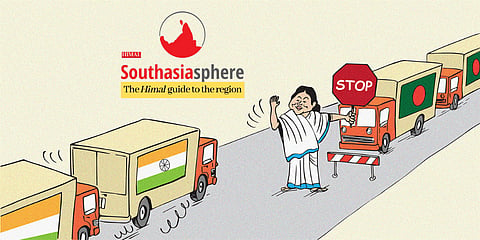Illustration by Gihan de Chickera.
Podcasts
Pakistan’s fake-degree problem, India-Bangladesh trade stalemate and more
Southasiasphere: Issue #9 - Updates and analysis from around the region.
This week in Southasia:
PAKISTAN
Creative license
Pakistan's aviation industry, particularly the country's flagship Pakistan International Airlines (PIA), is experiencing turbulence following new reports about dubious licences of many of the country's pilots. Starting 1 July 2020, the European Union Aviation Safety Agency barred the PIA from flying into European airspace for six months. A day later, Malaysia temporarily suspended pilots with Pakistani licences employed by its airlines (there are less than 20 in total.) Vietnam too has suspended 27 Pakistani pilots working for various airlines in the country. In late June, the PIA grounded 150 of its pilots.

